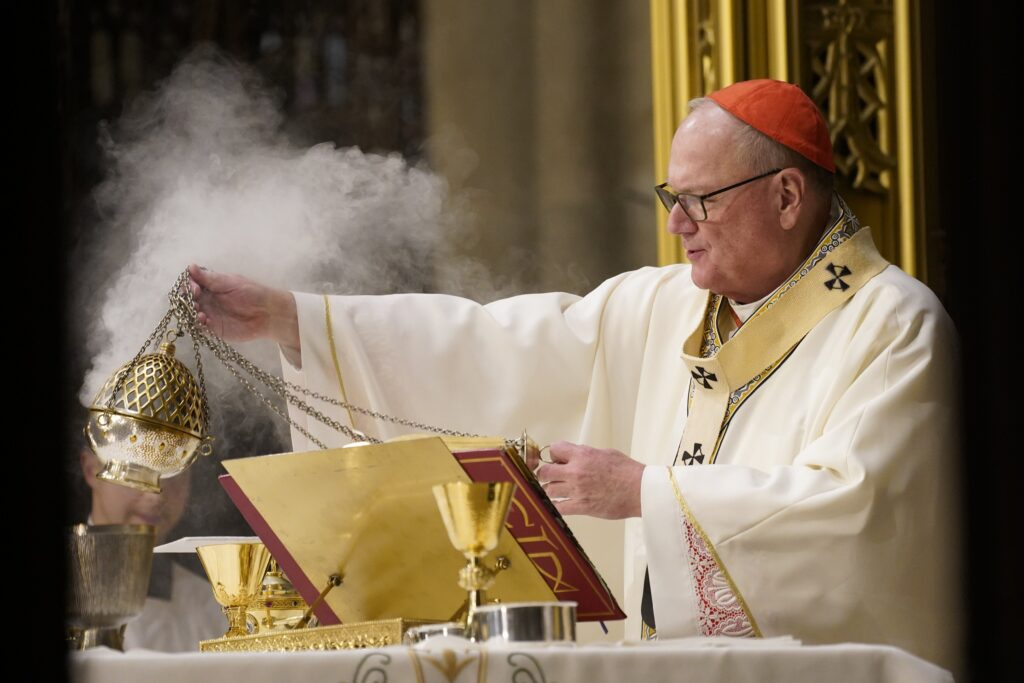Cardinal Timothy Dolan of New York recently published an article about why Catholics are not coming to Sunday Mass any more. The top reason: Mass is too long. He also notes that the "Liturgy of the Word"— readings from scripture— now overshadows the "Liturgy of the Eucharist," leading the Eucharist to become an "afterthought."
This provoked a lengthy dialogue about a sub-issue raised by Cardinal Dolan: whether homilies are too long. But a broader read of Cardinal Dolan's letter shows that it confirms all the worst fears of critics of the post-Vatican II liturgical changes.
Consider Cardinal Heenan's famous intervention at the Synod of Bishops in 1967, where he criticized the proposed Novus Ordo Missae. Cardinal Heenan's dire predictions are all confirmed by Cardinal Dolan's letter.
First, Cardinal Heenan had a pastoral critique. He noted that "[o]ur people love the Mass but it is Low Mass without psalm-singing and other musical embellishments to which they are chiefly attached." Turning to the Novus Ordo, he noted that "I cannot think of anyone with pastoral experience who would have regarded the sung Mass as being of first importance." As Cardinal Heenan notes, before the liturgical reform, the dominant form of the liturgy was the Low Mass, without singing. As Cardinal Dolan notes, Low Masses prior to the liturgical reform were quite short- under 30 minutes and often under 20 minutes. They frequently did not have a homily at all.
Cardinal Dolan confirms Cardinal Heenan's fear of overlong Masses with too much singing. He quotes a liturgical scholar who told him, “The greatest advance of liturgical renewal after the council was the restoration of the prominence and solemnity of the Easter Vigil. But the greatest negative of these last decades has been that every Sunday Mass is now as long as Holy Saturday!” Noting the extensive singing at modern Sunday Masses, he states: "So (my correspondents weighed in), an hour-and-a-half Mass — not just on solemnities, but every Sunday — has become normal, and they candidly propose that this is one of the factors driving people away."
Next, Cardinal Heenan notes, "There is more need than ever today to stress the Real Presence of our Lord in the Blessed Sacrament. No change in the Mass should be made which might seem to throw doubt on this doctrine."
But Cardinal Dolan notes that the Novus Ordo has effected just such a change: "And, as one priest wrote, the Eucharistic prayer is now an afterthought. 'It used to be,' he commented, 'that many wrongly acted as if everything prior to the offertory was unimportant; now, it seems that everything after the Liturgy of the Word is second class. Time it,' he dared me. 'A sung "Gloria" or a sung responsorial psalm, or the ‘Lamb of God’ can be longer than the Eucharistic prayer.'"
Since the Second Vatican Council, belief in the Real Presence of Christ in the Eucharist has plummeted. American Bishops are so concerned that they have launched a Eucharistic Revival. Again, Cardinal Heenan predicted all of this in 1967, and Cardinal Dolan is just confirming it.
Third, Cardinal Heenan noted that the faithful have "grown restless and disturbed on account of too frequent changes in the Mass," and that several English dioceses, including Heenan's own Westminster, had maintained one Mass in Latin each Sunday. He urged the universal Church to take up this question.
Of course, 50 years later, the Church is still struggling with this issue, as Pope Francis's Traditionis Custodes and its heavy-handed implementation has overriden pastoral prudence and forced many well-meaning bishops to cancel thriving Latin Masses. Cardinal Dolan does not address this in his article, but his silence in response to Traditionis Custodes speaks quite eloquently on this point.
Cardinal Dolan purports to have no desire to return to pre-conciliar practices. But his diagnosis of the problem shows that the critics of the liturgical reform have been vindicated almost completely. The solution is to have both Low Masses and Sung Masses each Sunday, and let the faithful decide which better suits their spiritual needs.
